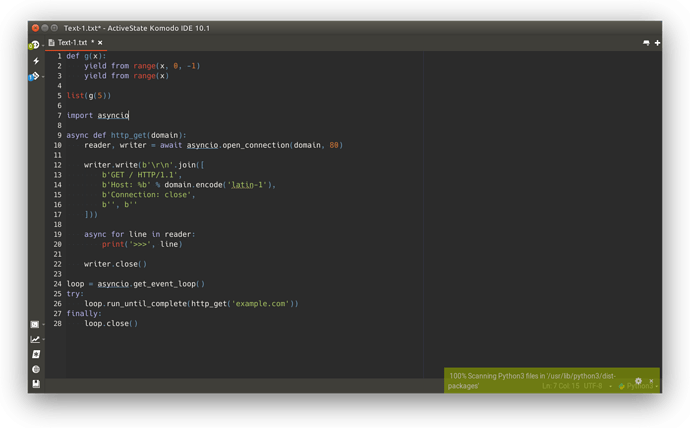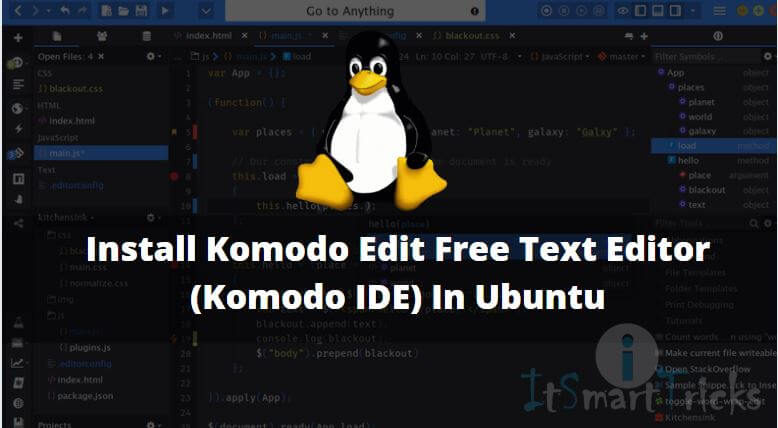Overall: Komodo is a great IDE with advanced features which provides multiple integrations and frameworks. It is available on multiple Operating Systems and supports almost all major languages eliminating the need for using multiple IDEs. Komodo Edit is a simplified open-source version of a paid Komodo IDE. It lacks some of the features of its paid version, like multilingual code intelligence, complex workplace integration, live preview, interactive shells, code refactoring, dependency detector, unit testing, and some others.
| Developer(s) | ActiveState |
|---|---|
| Initial release | November 2007; 13 years ago |
| Stable release | 12.0.1 |
| Repository | |
| Written in | C++, C, XUL, Perl, Python, JavaScript, Tcl[1] |
| Operating system |
|
| Size | ~74.6 MB |
| Type | Text editor, IDE |
| License | Mozilla Public License 1.1 |
| Website | komodoide.com/komodo-edit |
Komodo Edit is a free and open sourcetext editor for dynamic programming languages. It was introduced in January 2007 to complement ActiveState's commercial Komodo IDE. As of version 4.3, Komodo Edit is built atop the Open Komodo project.
History[edit]
Komodo Edit 4.0 was originally a freeware version of Komodo IDE 4.0, released in 2007-02-14.[2][3]
On 2008-03-05, ActiveState Software Inc. announced Komodo Edit 4.3 to be open-sourced software, licensed under Mozilla Public License (MPL), GNU General Public License (GPL), and GNU Lesser Public License (LGPL).[4]
Open Komodo[edit]
It is a subset version of Komodo Edit, with initial goal of Web development. The code was to be available between late October or early November 2007,[5] with Open Komodo code repository created by ActiveState in August 2007.
On 2007-10-30, ActiveState Software Inc. announced the release of Open Komodo.[6] The initial release was 1.0.0 Alpha 1.[7]
Komodo Snapdragon[edit]
It is an announced initiative from ActiveState to create an open source development environment that promotes open standards on the web. It was to be based on Open Komodo.[8]
Features[edit]
Many of Komodo's features are derived from an embedded Python interpreter.[9]
Open Komodo uses the Mozilla and Scintillacode base to provide its features, including support for many popular languages (including Python, Perl, PHP, Ruby, Tcl, SQL, Smarty, CSS, HTML, and XML), across all common operating systems (Linux, OS X, and Windows). The editor component is implemented using the Netscape Plugin Application Programming Interface (NPAPI), with the Scintilla view embedded in the XML User Interface Language (XUL) interface in the same manner as a web browser plugin.
Both Komodo Edit and IDE support user customizing via plug-ins and macros. Komodo plug-ins are based on MozillaAdd-ons and extensions can be searched for, downloaded, configured, installed and updated from within the application. Available extensions include a functions list, pipe features, additional language support and user interface enhancements.
Komodo IDE has features found in an integrated development environment (IDE), such as integrated debugger support, Document Object Model (DOM) viewer, interactive shells, source code control integration, and the ability to select the engine used to run regular expressions, to ensure compatibility with the final deployment target.

The commercial version also adds code browsing, a database explorer, collaboration, support for many popular source code control systems, and more.[10] Independent implementations of some of these features, such as the database editor, Git support, and remote FTP file access, are available in the free version via Komodo Edit's plugin system.
References[edit]
- ^'Python IDE (was: PythonWin troubleshooting)'. Bytes. Archived from the original on 8 July 2011. Retrieved 17 June 2011.
- ^ActiveState Goes Open Source - Hopes to turn Komodo into the Godzilla of dynamic language IDEs
- ^Komodo Edit 4.0 Released
- ^Komodo Edit Now Open Source
- ^Komodo Spawns New Open Source IDE Project
- ^Open Web Gains New Open Source Development Tools
- ^Open Komodo Web Tools Project Launched
- ^Komodo Snapdragon
- ^'...an internal update to Python 2.6 -- from which Komodo draws most of its functionality...' InfoWorld February 26, 2009
- ^Komodo Edit vs. Komodo IDE
External links[edit]
This brief tutorial shows students and new users how to install Komodo Edit on Ubuntu 20.04 | 18.04.
When looking for a cross-platform, simple code editor (Python, Perl, Ruby, HTML/CSS, JavaScript and more) for programming and web development, you should probably take a look at Komodo Edit.

This simple yet powerful code editor for programmers provides basic functionality, like editing and writing basic programming codes. It’s more like Notepad++ on steroids for Windows systems and other platforms.
For a more advanced version of Komodo, you’ll have to purchase Komodo IDE. It comes with all the power you need to create powerful programs.
When you’re ready to install Komodo Edit, please continue with the steps below:
Step 1: Download Komodo Edit
Komodo Ide Download
To manually install Komodo Edit, you’ll have to go to its download page and get a copy of the installer. The download page can be found from the link below.
On the page, download correct arch (32bit or 64bit) for your system. At the time of this writing, the latest version was at 12.0.1.
The default download location on Ubuntu systems is in the /tmp folder of your home directory.
For x86 version, use the link below:
Step 2: Install Komodo Edit
After downloading and extracting the file as shown above, change into the newly extracted folder, then run the commands below to begin the installation.
The installation is pretty straightforward. After a bring moment, you should get a message similar to the one below that the installation was successful.
After the installation process is complete, add “komodo” to your PATH variable.
First open the .bashrc file in a text editor:
Next, copy and paste the line into the file, then save it.
Komodo Ide Vs Pycharm
Finally run the commands below to apply the configuration.
You may also want to run this command:
After that, go to Ubuntu Activities > Komodo Edit
When you open Komodo Edit the first time, you’ll be prompted to customize it. I’d accept the default and continue.
After customizing, begin enjoying Komodo Edit.
Conclusion:
This post showed you how to install Komodo Edit on Ubuntu 20.04 | 18.04. If you find any error above, please use the comment form below to report.
Komodo Ide 11
Thanks,
Download Komodo Edit
You may also like the post below:
